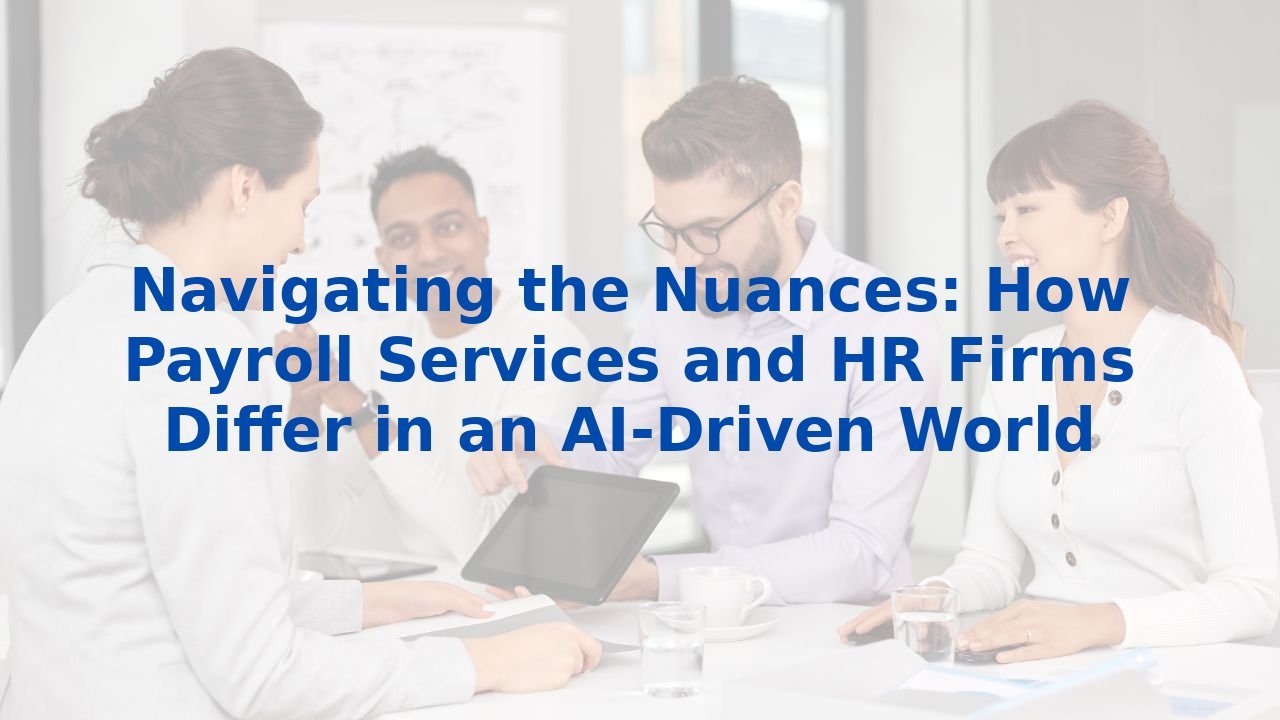Navigating the Nuances: How Payroll Services and HR Firms Differ in an AI-Driven World
Understanding the Distinction: Payroll Services vs. HR Firms
In today's fast-paced business environment, organizations often find themselves grappling with a multitude of processes designed to manage their workforce effectively. Two crucial components of human resources management are payroll services and HR firms. While their functions overlap in some areas, they serve distinct purposes that cater to different organizational needs.
What Payroll Service Providers Do
The primary function of a payroll service provider is to handle all aspects related to employee compensation. This includes calculating wages, withholding taxes, and ensuring compliance with tax regulations. Payroll providers aim to simplify payroll processing by issuing paychecks or enabling direct deposits, filing payroll taxes, and generating detailed financial reports. Essentially, they deal with the numbers so that businesses can focus on their core activities.
The Role of HR Firms
On the other hand, HR firms encapsulate a broader spectrum of services. Their mission is to manage various aspects of human resources, such as recruitment and staffing, training and development, performance management, compliance with labor laws, benefits administration, and fostering positive employee relations. By outsourcing HR functions to specialized firms, businesses can streamline their operations and allow their in-house teams to focus on strategic initiatives that propel growth.
The Intersection of AI with Payroll and HR
Both payroll service providers and HR firms are recognizing the potential of Artificial Intelligence (AI) to enhance their functions and overall efficiency. The integration of AI can revolutionize these processes in several ways.
Enhancing Payroll Efficiency with AI
AI can significantly optimize payroll services, reducing the time and effort involved in wage calculations and tax compliance. Advanced algorithms can analyze massive datasets in real-time, ensuring accurate and timely pay processing while minimizing human errors. This is particularly beneficial for businesses that handle complex payroll structures or operate in multiple jurisdictions with varying tax obligations. Software powered by AI can automate routine tasks, allowing payroll staff to focus on strategic decision-making and rare issues that may arise.
Streamlining HR Functions with AI
For HR firms, AI offers the promise of smarter recruitment processes and enhanced workforce management. AI-driven systems can sift through countless resumes, identifying the best candidates based on specific criteria and reducing the time-to-hire. Additionally, AI can support employee training and development through personalized learning experiences tailored to individual needs, making the learning process more efficient. With AI managing mundane tasks, HR professionals can devote more time to strategic planning, performance evaluations, and fostering a positive workplace culture.
The Importance of Employee Training in an AI-Driven Landscape
As AI technology continues to permeate various business processes, it becomes imperative for employees to adapt and develop skills that complement these tools. Training programs focusing on AI can empower staff to leverage new technologies effectively, from data analytics to automation tools designed to streamline operations.
By investing in AI training for employees, organizations can ensure a smooth transition into an AI-enhanced work environment. Not only does this promote a culture of continual learning, but it also instills confidence among staff members as they harness AI technologies to improve their productivity and performance.
Building a Future-Ready Workforce
In this evolving landscape, companies that equip their workforce with AI skills stand to gain a competitive edge. They can respond swiftly to market changes, better meet customer expectations, and ultimately drive greater business growth. Whether through tailored employee training programs or workshops that address the specific needs of different teams, organizations need to prioritize the integration of AI into their training frameworks.
Conclusion: Embracing the Synergy of Payroll and HR with AI
The distinction between payroll service providers and HR firms is significant, yet both play a pivotal role in managing an organization's most valuable asset—its people. The incorporation of AI within these domains can enhance processes, improve accuracy, and provide valuable insights that fuel decision-making. By actively embracing AI and fostering a culture of continuous learning, businesses can not only streamline their operations but also empower their employees to thrive in a digitally-driven world.
Ultimately, whether you're looking to refine payroll functions or bolster HR services, recognizing the power of AI and investing in your workforce's capabilities will be crucial in navigating the complexities of modern business. Together, these elements can pave the way for a more efficient, productive, and engaged workforce.



